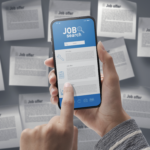As technology evolves at an unprecedented pace, Artificial Intelligence (AI) and machine learning have emerged as game-changers for various industries, including Human Resources (HR). Integrating AI into HR Information Systems (HRIS) is revolutionising traditional HR processes, offering a glimpse of the future of HR management. Below, we explore the profound impact of AI on HR processes, its implications for the future of work, and how HR teams can future-proof themselves to thrive in this era of unprecedented change.
The Power of AI in HR
AI’s integration into HRIS catalyses a transformative shift in how HR functions operate. Talent
- Acquisition and Recruitment
AI’s impact on talent acquisition has been particularly transformative. Advanced algorithms enable HR teams to identify the most suitable candidates through vast applicant pools quickly. By analysing data from resumes, social media profiles, and other sources, AI-driven systems can assess candidate qualifications, predict job fit, and identify potential cultural alignment with the organisation. This data-driven approach to recruitment saves time and resources and leads to better hiring decisions, laying the foundation for a future-proof workforce.
- Employee Experience and Engagement
AI’s role in HR extends beyond the recruitment process; it is equally valuable in enhancing employee experience and engagement. AI-powered chatbots and virtual assistants provide employees with 24/7 support, answering queries and providing relevant information on policies, benefits, and career development opportunities. Furthermore, AI-driven sentiment analysis tools can gauge employee satisfaction and well-being, providing HR teams with real-time insights to address concerns promptly and bolster overall engagement levels.
- Predictive Analytics for Workforce Planning
AI-driven predictive analytics is a game-changer in HR workforce planning. By analysing vast amounts of data from HRIS, performance evaluations, and other sources, AI can forecast future workforce trends, identify potential skill gaps, and recommend targeted training programs. These insights empower HR teams to make proactive decisions, ensuring the organisation remains agile and prepared for future challenges.
Embracing AI for Future-Proofing
To future-proof themselves, HR teams must embrace AI strategically and responsibly. The first step is understanding the nuances of AI applications relevant to their specific HR functions. HR professionals can design tailored solutions that align with organisational goals by identifying pain points and opportunities where AI can add value.
Investing in upskilling HR professionals is critical to unlocking AI’s full potential within HRIS. HR leaders should promote continuous learning and provide training on AI technologies and data analysis. By developing a workforce proficient in AI, HR teams can harness its capabilities effectively and use data-driven insights to make more informed decisions. Additionally, fostering a culture of curiosity and experimentation encourages HR teams to explore AI applications in unique and innovative ways, further enhancing HR processes.
Maintaining Human-Centricity
While AI promises remarkable efficiencies, it is essential to balance automation and human-centricity. HR teams must remain attuned to the emotional and interpersonal aspects of the employee experience that AI cannot replicate. By leveraging AI to automate routine tasks, HR professionals can dedicate more time and resources to building meaningful connections, nurturing employee development, and driving organisational culture.
Ethical Considerations
As AI becomes increasingly integrated into HRIS, organisations must prioritise ethical considerations. HR teams should ensure that AI-driven decisions are transparent, unbiased, and fair. Addressing potential biases in AI algorithms is crucial to maintaining a diverse and inclusive work environment. By cultivating ethical AI practices, organisations build trust among employees, enhancing acceptance and cooperation in AI implementation.
Collaborating with AI
Rather than fearing AI as a threat to job security, HR professionals should view it as a powerful ally. AI augments HR capabilities, allowing teams to focus on strategic, value-driven tasks. By embracing AI as a collaborative partner, HR professionals can strengthen their problem-solving abilities and gain deeper insights into workforce dynamics, fostering a more agile and responsive HR function.
Collaboration with technology partners specialising in AI and machine learning is an invaluable strategy for future-proofing HR. Partnering with experts allows HR teams to leverage cutting-edge technologies and gain access to the latest AI advancements. These collaborations also offer personalised solutions tailored to the organisation’s unique needs, optimising HRIS for maximum impact.
Conclusion
The AI revolution is reshaping the HR landscape, presenting HR teams with transformative possibilities. Embracing AI as a strategic ally empowers HR professionals to unlock new levels of efficiency, data-driven decision-making, and employee engagement. By nurturing a culture of continuous learning and ethical AI implementation, HR teams can confidently navigate the future, ensuring their practices remain future-proof. Collaboration with technology partners further enhances AI integration, creating an HR environment that thrives in the dynamic, AI-driven era. Embracing the AI revolution in HR is not just a choice but a necessity to remain at the forefront of the ever-changing HR landscape.









